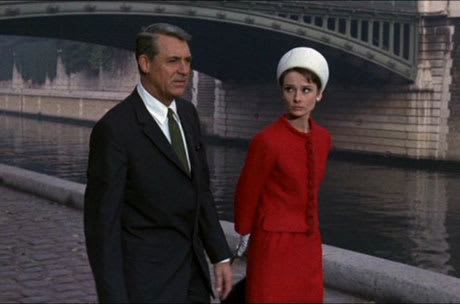In 1963, movie making in Hollywood was beginning to fall apart. The major studios were mostly run by men who ascended to power in the '20s and '30s, unable to steer audiences away from their newfangled television sets and unwilling to keep pace with cultural changes. 1963 was the year of the most expensive film production to date (Cleopatra) and even its relative failure couldn't deter the moguls from funnelling cash into overblown spectacles for the rest of the decade. Starring two of the biggest icons in cinema history, Charade wasn't exactly a low-budget quickie, but it typified the other side of the kind of films that only Hollywood could make: both a retro throwback and a classy contemporary production. Charade stars Audrey Hepburn as Regina Lampert, a wealthy socialite living in Paris who's shocked to return home to an empty apartment and the news of her husband's death. She crosses paths with the dashing Peter Joshua (Cary Grant), who winds up being her protector, until she thinks she can't trust him. Like any good mystery, the less you know about Charade going in, the better. Revealing its first big important twist fairly early on, the film unfolds as a tightly paced cat-and-mouse caper. Director Stanley Donen was mostly noted for his skill with musicals (namely Singin' in the Rain), and he directs the film like an espionage ballet, revealing just the right amount of information at just the right time. Brilliantly constructed by screenwriter Peter Stone from his story, many have compared the film to the work of Alfred Hitchcock, and the influence is clearly there, but Donen makes the work his, eschewing Hitch's deeply ingrained psychological morbidity for pure thrills. And, unlike Hitchcock, there's no underlying guilt involved in the film's romance. Hepburn's Reggie keeps believing in Grant's enigmatic charmer no matter how many times the tables are turned. This new Universal anniversary edition marks a number of DVD reissues by the studio to celebrate its centenary. Unfortunately, unlike the still available Criterion edition, there are no extras related to the film, just two brief documentaries on former Universal studio heads Carl Laemmle and Lew Wasserman. Some work on how the film fits into Universal's history would have been nice. Regardless, the film is essential.
(Universal)Charade
Stanley Donen

BY Bjorn OlsonPublished Mar 20, 2012